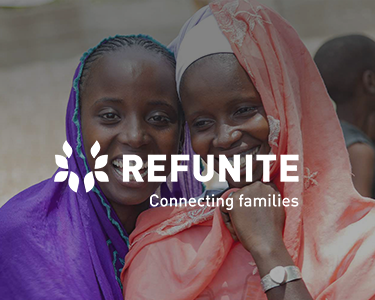
In this blog post, our Software Developer Mike Manuthu unveils REFUNITE’s most recent development: a family reconnection app in Arabic, which seeks to ease the burden for separated, Syrian families. The app is an an integral part of REFUNITE’s humanitarian response to the Syrian conflict.
While Mike Manuthu is part of REFUNITE’s lab in Nairobi Kenya, his job is in no way confined to Africa. In fact, during the last 4 months, Mike has been hard at work and deeply focused on building a new method of accessing REFUNITE’s platform to better serve users in Iraq, Jordan and Turkey.
 This new entry point will make it easier for Arabic-speaking families to search, connect and communicate with their missing loved ones. The app is currently being tested Iraq, Jordan and Turkey, before it is deployed to other countries. Below is an interview with Mike on how the project is coming along.
This new entry point will make it easier for Arabic-speaking families to search, connect and communicate with their missing loved ones. The app is currently being tested Iraq, Jordan and Turkey, before it is deployed to other countries. Below is an interview with Mike on how the project is coming along.
Why is this Arabic version so important?
In February 2014, REFUNITE and long-term technology partner Ericsson entered into official partnerships with Zain Group in Jordan, Asiacell in Iraq and Avea in Turkey.
To address the conflict in Syria, which has led to more than 3 million forcibly displaced people, the mobile companies committed to launch a series of family reconnection services to reconnect Syrian families, including a family tracing app.
Back then, our mobile app was already available in English, French, Somali, Sudanese Arabic and Swahili. We realized that there was a need for an Arabic version of our mobile search tool as well as some major updates.
What has been your experience in working on this app?
Working with various languages and converting an entire system into few characters, keeping in mind the constraints of SMS, is a welcome challenge and an innovative way of reconnecting separated families. I look forward to successfully testing the updated app to benefit REFUNITE’s users.
How is this new version different than the already-existing mobile search tool?
It’s an extra tool in our arsenal. The core (API) still remains the same but the interface is what changes. That means that whether you use the Web, USSD and SMS, the search will return the same results.
How are you testing the mobile application in the field?
We tested the app by using paper prototypes and carrying out interviews with Syrian refugees in Za’atari refugee camp in Jordan.
The response was overwhelmingly positive and validated a range of assumptions and concerns regarding the user experience, that we could then build further development iterations from.
The field test really revealed a need for refugees to take the search for missing family into their own hands.
What was the biggest challenge?
It’s always a challenge working with the Arabic language; the biggest being dealing with the Arabic numerals.
Your biggest aha-moment?
It turns out that the above challenge of handling the Arabic numerals had a simple fix but it took a while to discover this.
What’s been the feedback so far?
We have received very positive response from the mobile operators that we have partnered with and from the field tests carried out.
What’s it been like to work with the partners?
With a shared commitment to Technology for Good, Ericsson is the main technology partner and provides technical support and integration of REFUNITE’s mobile search tool into mobile networks.
Zain Group, Avea and Asiacell are our mobile network partners who send text messages to people living in refugee camps and refugee prone areas, offering them an opportunity to register for the reconnection service. Global Voices provides assistance in terms of translations of the SMS into Arabic, and soon also other languages.
How will this mobile application benefit separated families?

In Jordan, Turkey and Iraq, SMS is readily available, affordable and easy to access. This is because it uses the standardized phone protocol known as Global System for Mobile Communications (GSM).
According to Ericsson’s Mobility Report released in November 2014, GSM-only subscriptions represent the largest share of mobile subscriptions today: 85 percent. Less affluent users in developing markets often choose a low-cost mobile phone and subscription.
The United Nations Refugee Agency, UNHCR, estimates that the number of people displaced by the ongoing conflict in Syria is over 3 million and likely to increase in 2015. The displaced live in camps within neighboring countries of Jordan, Iraq and Turkey.
REFUNITE is targeting subscribers of Zain Group, Avea and Asiacell to give them a chance of finding their missing loved ones. REFUNITE’s Web application is already available in these countries but for refugees who cannot afford or access web services, there is need for the new mobile app.
 Moreover, some Mobile Network Operators do not support Arabic gateways (a network node equipped for interfacing with another network that uses different communication protocols) but with the new entry point that we are developing, we can work around this challenge.
Moreover, some Mobile Network Operators do not support Arabic gateways (a network node equipped for interfacing with another network that uses different communication protocols) but with the new entry point that we are developing, we can work around this challenge.
What have you learned on this project?
Deploy early. Test and do more tests.
Does this mean, that you can finally get some sleep now?
No sleep 🙂 Well, we still have to monitor the campaigns. Learn and iterate if there’s a need to.
More info:
Connect with Mike and share your ideas: mima@refunite.org



